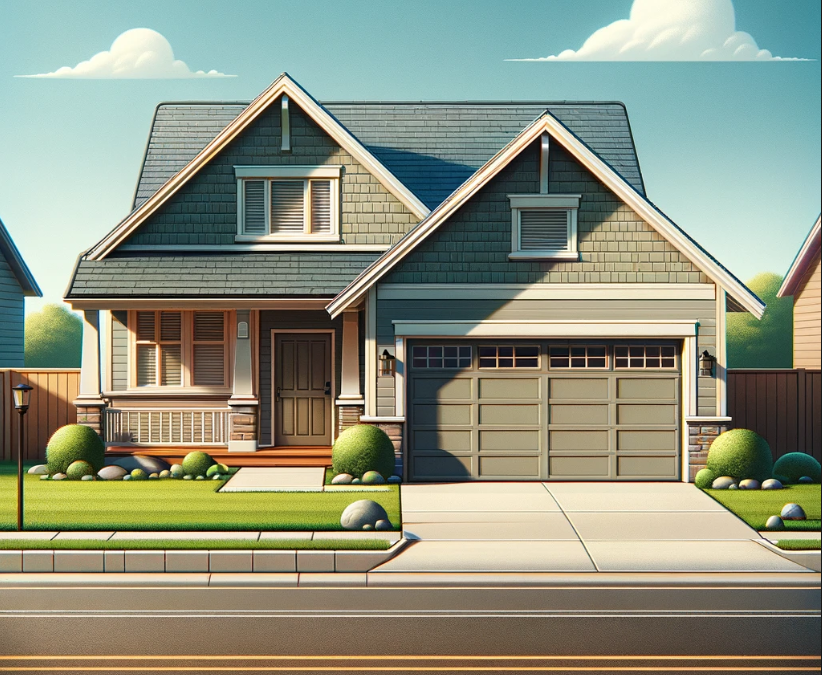Embarking on a home improvement journey often involves making impactful choices, with the selection of a new garage door being a standout decision. This choice influences more than just your home’s curb appeal; it also plays a pivotal role in enhancing security and optimizing energy efficiency. As we delve into this comprehensive guide, we will equip you with the crucial information needed to navigate the world of garage door types and materials, ensuring your decision is not only aesthetically pleasing but also cost-efficient and practical for your unique needs.
Understanding Garage Door Types and Materials
The journey begins with choosing the right type and material for your garage door. Each option comes with its unique set of benefits and costs.
Garage Door Types
- Roll-up Doors: These doors are a common sight in commercial settings due to their durability. While roll-up doors offer longevity and robustness, they are positioned on the higher end of the price spectrum, making them a significant investment.
- Sectional Doors: As the most popular choice among residential properties in the U.S., sectional doors strike a perfect balance between cost and functionality. Their design and mechanics suit a wide range of homes, making them a versatile and practical option.
- Side-hinged Doors: These doors evoke the charm of traditional barn doors, making them ideal for homes with specific architectural styles that seek a classic or rustic appearance. Side-hinged doors provide a unique aesthetic appeal while maintaining functionality.
- Tilt-up Doors: Constructed as a single solid piece, tilt-up doors open by tilting up and into the garage. They are often more affordable compared to other types, but require more clearance space, making them suitable for homes with larger driveways or spacious garages.
Material Choices
- Steel Doors: Known for their high durability and low maintenance requirements, steel doors are a practical choice for many homeowners. However, they can be prone to dents, so they may not be ideal in areas where they might be subject to heavy impact.
- Aluminum Doors: These doors are lighter than steel and are resistant to rust, making them perfect for large garage doors or homes in areas with high humidity. Aluminum doors combine durability with ease of handling.
- Wood Doors: Offering a timeless and classic look, wood doors can significantly enhance a home’s aesthetic. However, they require more upkeep to maintain their appearance and integrity, including regular staining or painting.
- Fiberglass Doors: Especially suitable for coastal areas, fiberglass doors resist corrosion caused by saltwater. This makes them an excellent choice for homes near the sea, as they combine durability with resistance to harsh environmental conditions.
Size and Customization
The size of your garage door directly impacts the cost. Standard sizes are more affordable, while custom sizes increase the price. Customization options like adding windows or unique designs also add to the cost but can enhance the aesthetic appeal of your home.
Insulation and Energy Efficiency
Investing in a well-insulated garage door is a practical step toward enhancing your home’s energy efficiency. Such doors are designed to minimize the transfer of heat and cold, thus maintaining a more consistent temperature within your garage. This has a knock-on effect of reducing the demand on your home’s heating and cooling systems, leading to potential energy savings. While specific statistics on energy savings for residential settings vary, the effectiveness of insulated garage doors in stabilizing garage temperatures is well noted. Common insulation materials for these doors include polystyrene and polyurethane, with the latter being more efficient, albeit slightly more expensive. The choice of material, along with a quality installation, can significantly impact your home’s energy consumption and comfort.
Mechanism and Hardware Considerations
When deciding between manual and automatic garage doors, it’s important to consider both the initial installation cost and the convenience of daily use. Automatic doors, while more costly upfront, provide ease of access and enhanced security, making them a popular choice for homeowners seeking practicality and comfort. On the other hand, manual doors are less expensive but require physical effort to operate. Additionally, the choice of hardware, including springs, tracks, and openers, plays a crucial role in the door’s functionality and longevity. For instance, torsion springs, though pricier than extension springs, are known for providing better balance and having a longer lifespan, contributing to the overall convenience and efficiency of the garage door system.
Installation Costs and Professional Services
Professional installation ensures safety and efficiency but adds to the overall cost. That’s why it’s essential to choose reputable services, as poor installation can lead to increased maintenance costs down the line. On average, installation can cost between $500 and $1,200, depending on the door type and complexity.
Maintenance and Long-Term Costs
Regular maintenance is key to extending the life of your garage door. Maintenance includes simple tasks like lubricating moving parts and checking for wear and tear. Neglecting maintenance can lead to costly repairs or even full replacements sooner than expected.
Additional Features and Technology Integration
Modern garage doors come with features like remote access and security integration. While these add to the initial cost, they offer convenience and improved security. For instance, a survey by the National Association of Realtors found that 50% of homebuyers value smart home technology, which can include smart garage doors.
Local Climate and Environmental Considerations
The local climate plays a crucial role in your garage door choice. Materials like wood may not fare well in very humid climates, while steel can be prone to rust in coastal areas. Choosing a material suited to your environment ensures longevity and reduces maintenance costs. Therefore, cost-efficient garage door installation requires balancing initial costs with long-term value.
By considering the type, material, insulation, and additional features, you can make an informed decision that enhances your home’s value and functionality. For more personalized advice, consider contacting Friendswood Garage Door Repair experts. Stay tuned to our blog, or contact us if you need a professional garage door installation.

